Semester7
Notes of courses done/attended in semester 7 in college
Lecture 22
Video Link
link
- In distributed system, we have nodes connected over a network
- a program running on single node
- we have some challenges
- total failure
- partial failure
- in single node system, program either fails or succeed (reaches expected point or not)
- in distributed system, it may have more than 2 states
- one process down does not mean system will go down
- partial failures are diff to detect, since system is not down and seem to be working
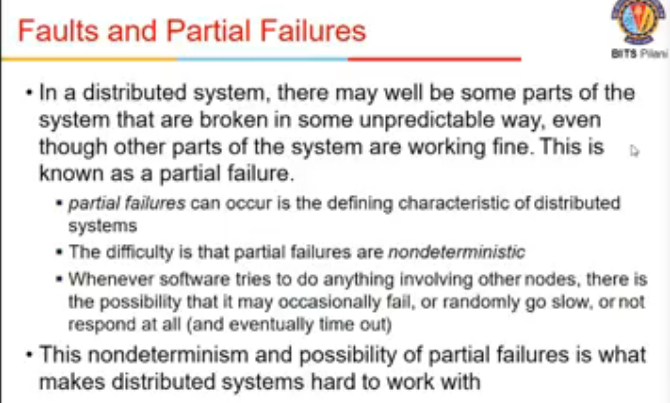
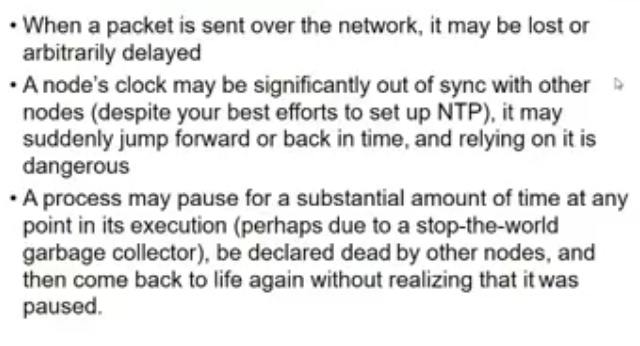
Synchrony
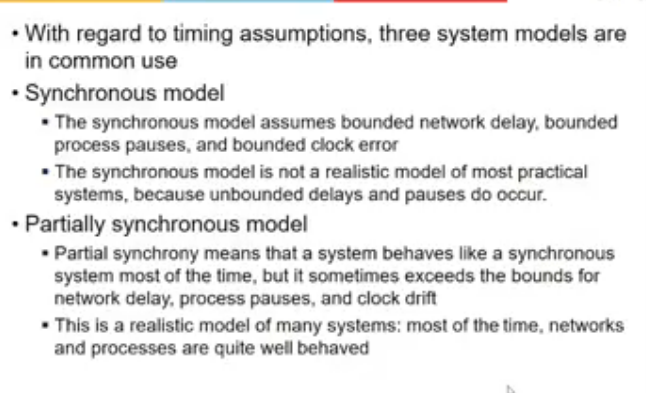
- assumption on n/w delays
- three types of models
- synchronous
- n/w behavior matches our expectations
- agar 1s me dena pkt n/w ko, toh utne me hi dega
- bounds me de raha
- agar nahi dia => system fail hua hai
- not realistic model, bcz unbounded delays hote hai
- partially synch
- n/w sometimes behaves as synch, sometimes as asynch
- realistic model
- most of times, bounds are followed
- tcp me retransmission timeout value hoti hai, we expect reply to come within those bounds
- internet is generally partially of this type
- asynch
- no assumptions can be made
- delays are unbounded
- imp result (FLP Result)
- if there is a system in asynch setting, it is impossible to achieve on a consensus (agree upon ho)
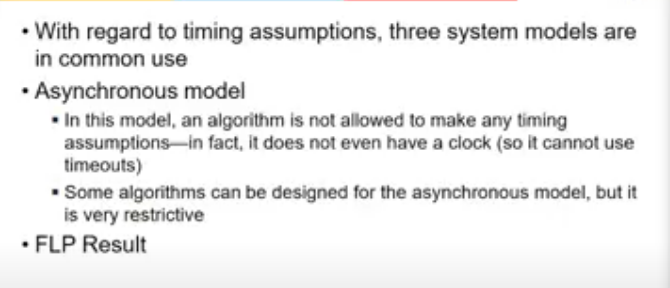
Failure Models
- when node fails, 3 common system models for nodes
- crash-stop faults
- node was working, at some point it fails, after that it is not part of system., it is done
- crash-recovery faults
- node failed at time t1, it might come back later at t2, tho t2-t2 time diff is not known
- challenges if node comes back, state uipdate ho chuki hai
- Byzantine (arbitrary) faults
- node might to anything, including trying to trick and deceive other nodes
- algos should take care of which failure they are modeling, and take care
Safety and Liveliness
- any execution happening on distributed system should follow these
- safety
- nothing bad happens
- every state within node is consistent with state other nodes have
- liveness
- something does happens
- algo should come to a conclusion
- deadlock type ki state na aa jaye

Failure Detectioon
- timeouts is one of mechanism to detect failure
- agar set timeout me nahi reply aaya => smth went wrong
- but node ya n/w kya fail hua, no one knows
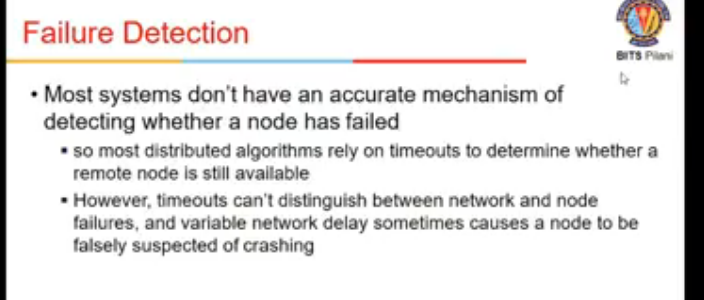
Fault Tolerance
- hadoop me dekha tha
- distributed systems are generally through msg passing
- this is shared-nothing system [not shared-message]
- faults are common in distributed systems
- when node fails, system should be robust to tolerate that failkues
- failure may mean multiple aspects node fall down
- n/w is divided into 2 parts (n/w partitioning)
- multiple nodes failed at same time
CAP
- Consistency, Availability , and Partition tolerance
- single user agar hai db me, no worry about concurrency issues
- multiple users => concurrency control needed
- db systems ensure these ACID properties
- atomicity
- txn may have multiple read/writes
- prop states that either txn happens completely or nothing happens
- Consistency
- data b4 txn and after txn are consistent
- Isolation
- temporary state of a txn (inconsistency) is not visible to others
- Durability
- whatever change is done should be durable even if system is crashed, it must remain
- to ensure these properties
- single node db me koi bt nahi, sab kuch ek jagah hai
- but if data is partitioned across multiple systems, it might delay (overhead int erms of time and availability)
- CAP thm says that out of consistency, availability, and partition tolerance, only 2 can be provided at a time
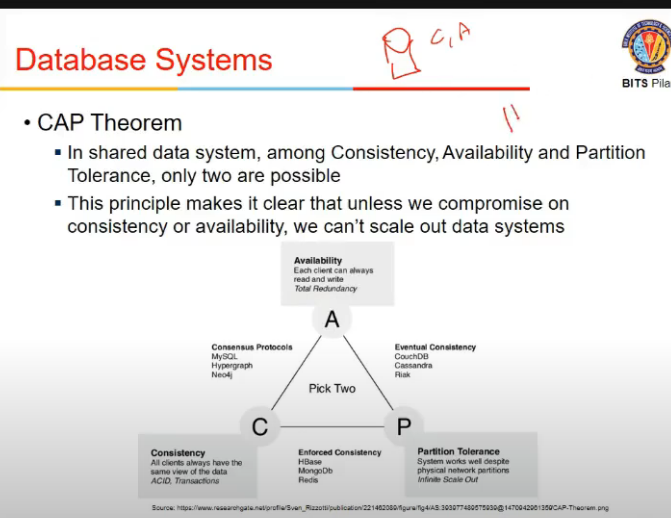
- single node me partitioning hi nahi hogi toh C,A dono mil gaye
- agar atleast 2 node hai
- partitioning possible
- so along with partitioning, I can only get consistency or availability
- Consistency?
- changes should be consistent
- if db is replicated, change in one must reflect in others as well
- even if it is partitioned (darta partitioned into disjoint subsets and distributed)
- constraints vagairah ensure karna, tough
- availability affect hogi (mtlb timely nahi milega bande ko reply)
- so tradeoff b/w consistency and availability
- Availability + Consistency
- either single system or some protocol in place
- Availability + Partition tolerance
- eventual consistency
- system maybe inconsistent at some pt of time, but eventually it will get corrected
- user may read inconsistent at some time
- dynamoDB is one eg
- there are mechanism where we can know if it is consistent or not
- Consistency + Partition tolerance
- any copy of data picked will be consistent
- MongoDB vagairah
- partition database in other systems, so that any txn requires data only for a particular system
- so agla involve hi nahi toh koi bt nahi consistency ki
- sharding karta na mongodb
BaSE (opposite to acid)
- basically available
- system does guarantee availkability
- soft state
- whatever state we see at one pt of time may change at any pt of time without any external input
- normal db me w/o input it fdoes not change
- router me hoti hai soft state => has some time after which it changes, hard state => which remains constant
- eventual consistency
- system will become consistent over time








